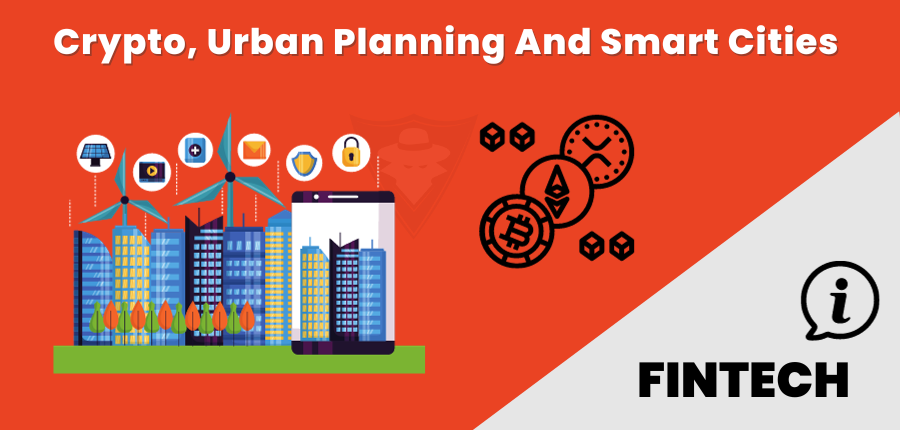Crypto’s Influence on Urban Planning and Smart Cities The dawn of the 21st century has ushered in an era where the fusion of technology with urban planning is no longer a futuristic concept but a tangible reality. At the...

Crypto’s Influence on Urban Planning and Smart Cities
The dawn of the 21st century has ushered in an era where the fusion of technology with urban planning is no longer a futuristic concept but a tangible reality.
At the heart of this transformative era are Smart Cities – sophisticated urban ecosystems that leverage the power of advanced technology to enhance the quality of life for their inhabitants.
These are not mere agglomerations of infrastructure but dynamic systems that adapt and evolve.
These ecosystems are designed to be more than just functional; they are built to be adaptable, resilient, and forward-thinking, embodying the very essence of innovation and progress.
Don’t overlook the need for investment education in the crypto market! Click https://quantum-momentum.com/ and learn more!
Overview of Smart Cities: Their Goals and Significance

Smart Cities embody the aspirations of urban developers to create environments that are not only habitable but also intelligent and responsive.
The objective is to integrate various aspects of ICT to manage a city’s assets – from local departments’ information systems and schools to libraries, transportation systems, hospitals, power plants, law enforcement, and other community services.
The goal is a more efficient city, with reduced costs and resource consumption alongside improved connectivity, livability, and sustainability.
These cities are designed to tackle urban challenges head-on – from traffic congestion and energy consumption to public safety and environmental sustainability.
They strive to be the epicenters of innovation, attracting businesses and talents, fostering economic development, and ultimately enhancing the well-being of every resident.
Cryptocurrency and Blockchain: Basics and Evolution
In parallel with the rise of Smart Cities, cryptocurrency has emerged from the shadowy origins of internet subculture to become a significant force in financial markets and a potential catalyst for change in various sectors.
While many focus on the investment aspect of cryptocurrencies like Bitcoin and Ethereum, it is the underlying blockchain technology that holds the promise of revolutionary change.
Blockchain is a system of recording information in a way that makes it difficult or impossible to change, hack, or cheat the system.
It is a digital ledger of transactions that is duplicated and distributed across the entire network of computer systems on the blockchain.
Each block in the chain contains several transactions, and every time a new transaction occurs on the blockchain, a record of that transaction is added to every participant’s ledger.
This decentralized and transparent nature of blockchain makes it highly secure and trustworthy.
Linking the Two: How Cryptocurrency Influences Urban Development
The convergence of Smart Cities and cryptocurrency, particularly through blockchain, is an intriguing aspect of urban development.
Cryptocurrencies offer a new way to finance projects, incentivize citizens, and facilitate transactions without the need for traditional financial institutions.
They are poised to transform the way we think about city services, governance, and community engagement.
Blockchain serves as the backbone for this new financial paradigm, providing a secure and efficient way to handle transactions and contracts.
It can streamline processes from voting systems to property records, utility billing to identity verification – all with enhanced security and reduced potential for fraud.
As a result, cities can become more democratic, transparent, and efficient, providing a level of engagement and convenience previously unattainable.
The potential of blockchain in urban planning extends to various sectors, including energy distribution, waste management, traffic optimization, and more.
It can enable a shared economy, optimize resource consumption, and automate municipal services, which leads to a more resilient and adaptive urban environment.
This technology, when synchronized with the needs and operations of a city, can unlock new opportunities for growth and innovation, paving the way for a smarter future.
Blockchain as a Driver for Smart Cities
Understanding Blockchain’s Role in Data Agility and Security
Blockchain technology is pivotal in enhancing data agility and security in smart cities. It offers a robust platform for the secure exchange of data, which is crucial in a setup where multiple stakeholders interact continuously.
Blockchain in Smart Cities: More than Just Bitcoin
The application of blockchain in smart cities transcends its original use in cryptocurrencies. It has evolved to facilitate transactions and interactions without intermediaries, making processes more efficient and secure.
Transforming Urban Management with Blockchain
Navigating Challenges from Traditional to Smart Cities
The transformation from traditional to smart cities comes with challenges like increased urbanization, congestion, and environmental concerns.
Blockchain technology can address these by enabling efficient management of resources and services.
The Role of Blockchain in Efficient Urban Management and Governance
Blockchain can revolutionize urban management by providing a transparent, immutable ledger for transactions and interactions.
This enhances the efficiency of public services and governance, leading to better urban management.
Specific Applications of Blockchain in Smart Cities
Application Areas of Blockchain in Urban Planning
Blockchain finds application in various sectors within smart cities, including energy management, transportation, and public administration.
Smart Energy: Blockchain for Efficient Energy Management
Blockchain can revolutionize energy management in smart cities by enabling peer-to-peer energy trading and enhancing transparency in energy transactions.
This contributes to the efficient use of resources and promotes the use of renewable energy sources.
Smart Mobility: Enhancing Transportation with Blockchain
Blockchain can improve transportation systems by facilitating real-time tracking, optimizing routes, and streamlining payment systems.
This not only enhances the efficiency of the transport network but also contributes to sustainability goals.
Public Administration and Services: Blockchain for Efficient Governance
Blockchain can transform public administration by enabling smart contracts and e-governance solutions. This leads to more efficient service delivery and greater transparency in government operations.
Risks and Challenges in Implementing Blockchain in Urban Settings
Data Security and Accuracy Concerns
While blockchain enhances data security, the integration of this technology in urban settings raises concerns about data accuracy and completeness.
Ensuring data integrity is crucial for the effective implementation of blockchain-based solutions.
Potential Risks from Cybersecurity Threats in a Hyper-Connected Urban Environment
The interconnected nature of smart cities makes them vulnerable to cyberattacks. Ensuring robust security measures is essential to protect against such threats and maintain the integrity of the blockchain network.
Future Opportunities: Cryptocurrency and Urban Economic Growth
Cryptocurrency Market Growth and Its Implications for Smart Cities
The growing cryptocurrency market presents numerous opportunities for smart cities, including new forms of transactions and economic activities. This can lead to innovative business models and revenue streams.
Business Opportunities and Tokenization in Urban Ecosystems
Tokenization, using blockchain to create digital tokens for various assets and services, opens up new possibilities in smart cities. This can lead to more efficient and secure transactions, as well as innovative ways to engage citizens and businesses.
Conclusion: The Road Ahead for Blockchain and Smart Cities
Current State and Future Prospects of Blockchain in Urban Development
Blockchain and smart cities are still evolving, with significant breakthroughs expected soon.
As technology advances and more stakeholders embrace these concepts, the scope for their application and impact will only grow.
Technological Innovations and Adoption Challenges
The integration of blockchain in smart cities is a journey marked by continuous innovation and adaptation.
Overcoming challenges related to technology adoption and stakeholder engagement will be key to realizing the full potential of this convergence.
Final Thoughts
The interplay of cryptocurrency and blockchain technology in shaping smart cities heralds a new era in urban planning.
By fostering secure, efficient, and transparent systems, blockchain stands to be a cornerstone in the smart city revolution, promising a future where urban life is not only smarter but also more sustainable and inclusive.









